Getting ready for a colonoscopy?
You’ll need to skip your vitamins—here’s why it matters and how it helps get accurate results. Let’s break it down!
Key Takeaways:
- Avoid Vitamins for Accurate Results: Stopping vitamins before a colonoscopy is crucial as certain supplements, particularly those containing iron or colored dyes, can interfere with the visibility of the colon lining, leading to inaccurate results.
- Improve Preparation by Avoiding Supplements: Vitamins and supplements may impact how well your body responds to the bowel preparation process, potentially leaving residues that compromise the effectiveness of the procedure.
- Follow Doctor’s Instructions for Safety: Always consult your healthcare provider about when to pause vitamins or supplements. Properly following instructions ensures a smoother procedure and more reliable diagnostic outcomes.
Understanding Colonoscopy Preparation
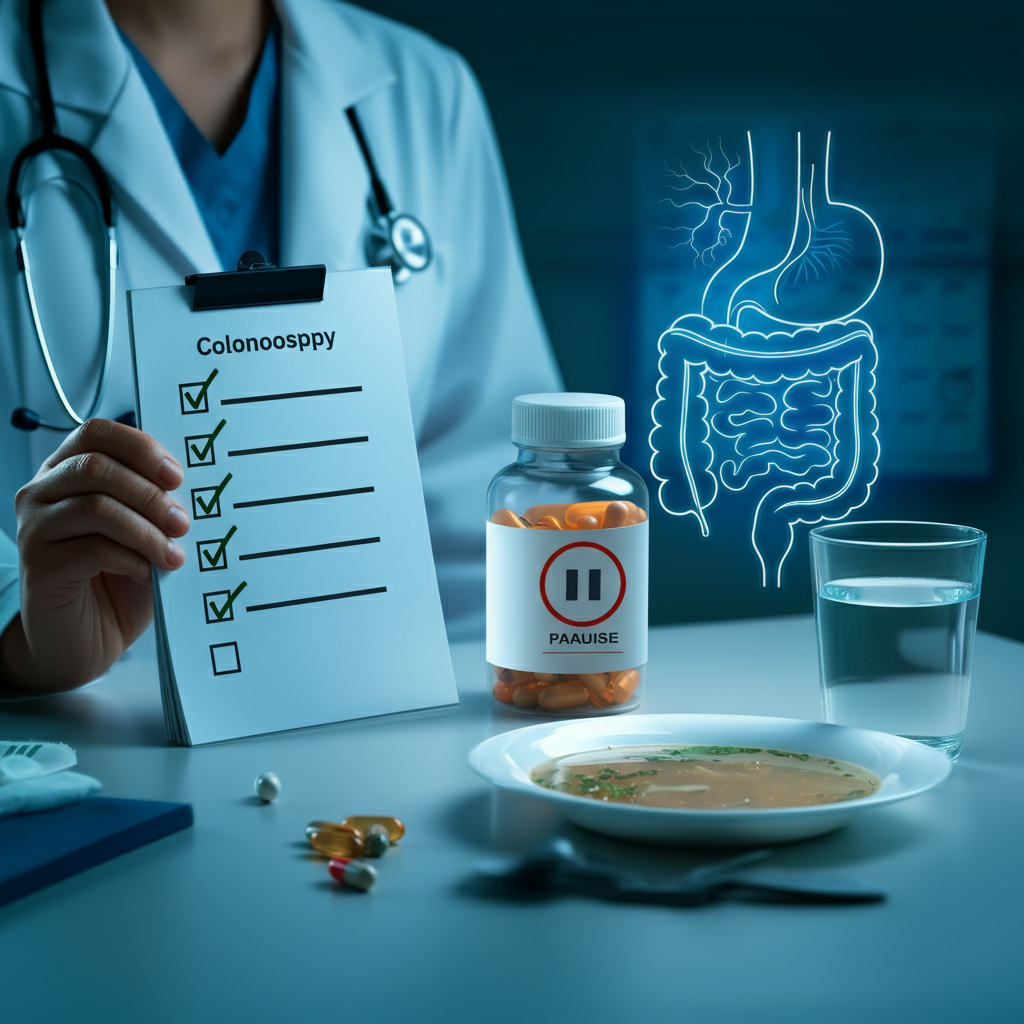
Why Vitamins Should Be Paused Before a Colonoscopy
When you’re prepping for a colonoscopy, halting vitamins and supplements is essential. Vitamins, especially those containing iron, can cause issues during the procedure. Here’s why:
1. Iron Supplements Can Obscure Results
- Iron pills may leave dark residues in your colon.
- This makes it harder for doctors to spot potential growths or polyps.
- If you’re anemic or rely on iron, ask your doctor for temporary alternatives.
2. Certain Vitamins May Thin Your Blood
- Vitamins like Vitamin E or fish oil act as natural blood thinners.
- This increases the risk of bleeding if polyp removal is necessary.
- Always inform your doctor about any supplements you’re taking.
3. Multivitamins Can Slow Digestion
- Some multivitamins contain calcium or other minerals that slow down digestion.
- A sluggish digestive system interferes with clearing out your colon completely.
- A clean colon is crucial for accurate results.
Steps to Follow Before Your Procedure
- Check with Your Doctor: Always confirm a tailored plan for any supplements you take.
- Pause Vitamin Intake 7 Days Before: This is the safest window for clearing your system.
- Hydrate Well: Drink plenty of water to aid the colon-cleansing process. Check this hydration guide for tips.
- Stick to Liquid Diets: Clear broths and drinks are key. Avoid solid food at least 24 hours prior.
- Trust the Process: Following guidelines ensures a clean colon and keeps your results spot-on.
Natural Ways to Prepare Without Supplements
If you dislike taking medications, try these for extra colon support:
- Eat fibrous foods like avocado and berries two weeks before your prep. (Avoid fiber closer to the test.)
- Drink herbal teas like ginger or peppermint for digestion.
- Plan meals rich in easily digestible foods, such as bananas or plain yogurt.
Why Stop Vitamins and Supplements?
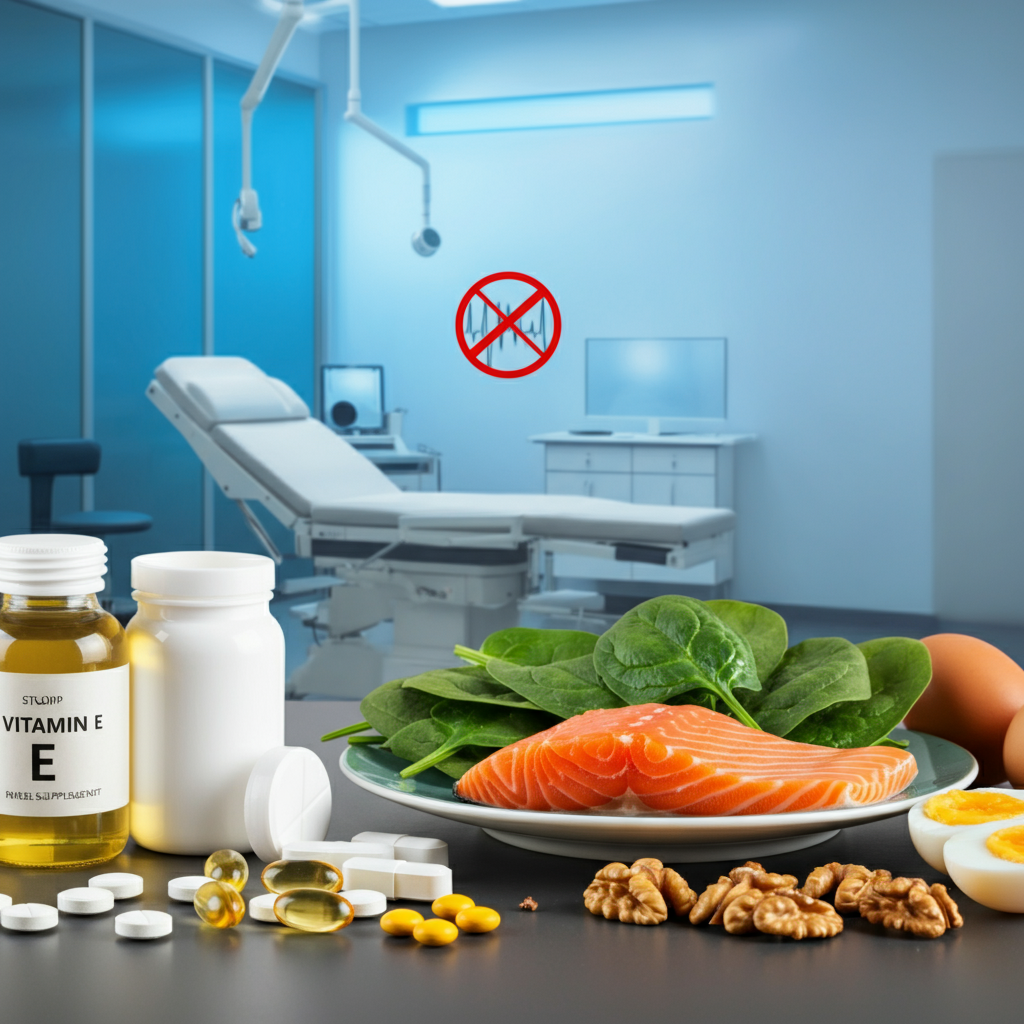
Why Stop Vitamins and Supplements? How Ingredients Affect the Procedure
When preparing for a colonoscopy or similar medical procedure, certain vitamins and supplements can interfere with accurate results. Stopping these in advance is a critical step to ensure a smooth procedure and optimal diagnostic clarity. Here’s why:
Iron Supplements
- Impact: Iron supplements can darken stool, making it resemble blood. This complicates the identification of blood or abnormalities in the colon.
- Solution: Discontinue iron supplements at least 7 days before your procedure. Use iron-rich foods like spinach, beans, or lean meats as an alternative source of iron.
Vitamin E and Fish Oil
- Impact: Both are known for their blood-thinning qualities, which may increase bleeding risks during or after the procedure.
- Solution: Stop Vitamin E and fish oil at least 7 days in advance. Shift to omega-3-rich fresh food like wild salmon, walnuts, or chia seeds.
Fiber Supplements
- Impact: Fiber supplements leave residue in the colon, which may reduce visibility during the procedure.
- Solution: Cut out fiber supplements for 2-4 days before the procedure, and switch to low-fiber foods like white rice, eggs, or plain chicken.
Herbal Supplements
- Impact: Certain herbal supplements, like ginkgo, garlic, and ginger, interfere with anesthesia or thin the blood, raising bleeding risks.
- Solution: Avoid herbal supplements at least 5-7 days prior and instead focus on mindful hydration with plain water or herbal-free broths.
Actionable Steps for a Safe Prep
To make your preparation process simpler and safer, follow these actionable steps:
1. Create a Checklist
List all the vitamins, supplements, and herbal products you take. Discuss with your healthcare provider which to stop.
2. Mark a Timeline
Stop supplements like iron, Vitamin E, and fish oil 7 days before your procedure. Avoid fiber-based products 2-4 days prior as part of your meal planning.
3. Communicate with Your Doctor
If you rely on specific supplements for health reasons, consult with your doctor. They may help find food-based alternatives or adjust timelines accordingly.
4. Switch to Real Foods
Replace supplements with natural nutrient sources. For example:
- Need calcium? Snack on low-lactose dairy like yogurt or cheese.
- Need antioxidants? Blueberries or oranges are great alternatives.
Why Can’t You Wear Makeup During a Colonoscopy?
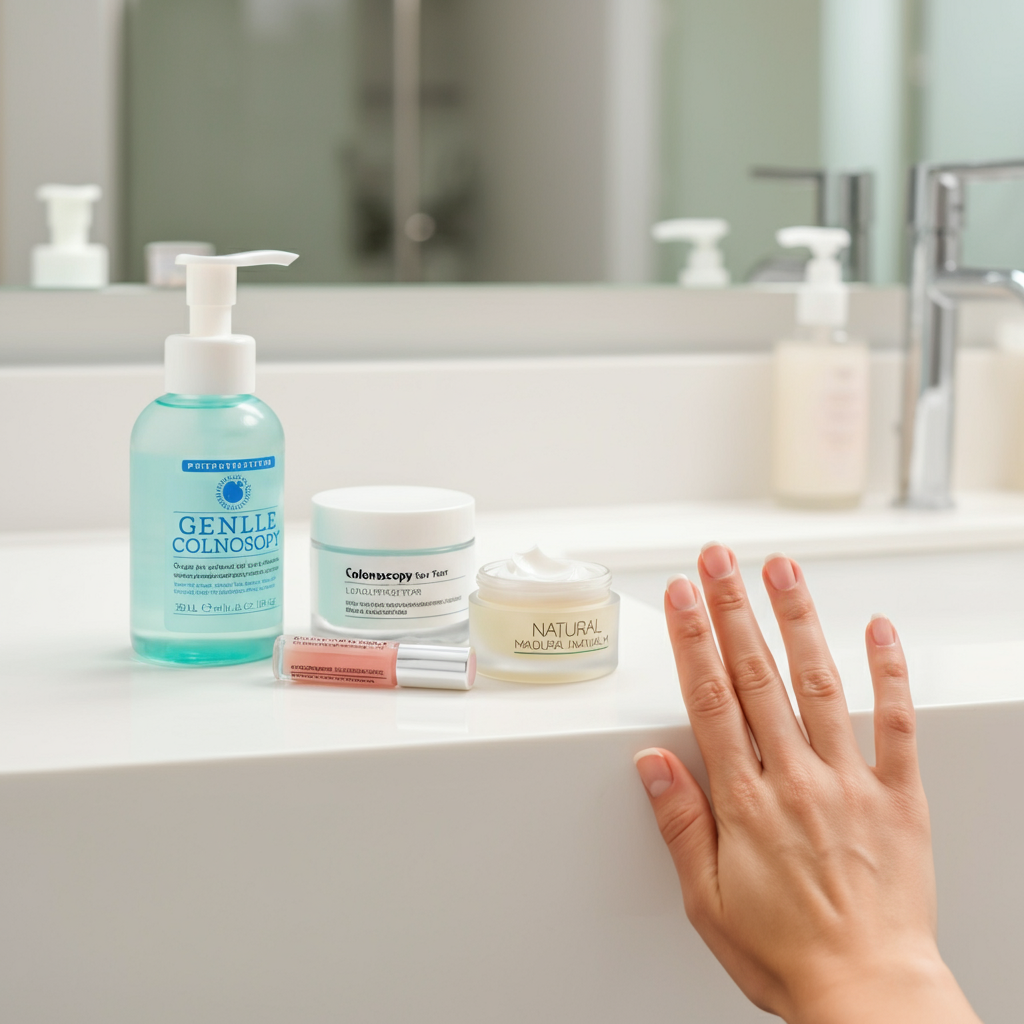
Actionable Steps to Prepare Your Skin Before a Colonoscopy
Cleanse Thoroughly
Use a gentle, fragrance-free cleanser to wash your face the evening before the procedure. Avoid any harsh scrubs or exfoliants as these can irritate your skin and compromise its natural barrier.
Example:Cetaphil Gentle Skin Cleanser is highly recommended for its soothing formula.
Skip Heavy Skincare Products
Avoid applying heavy creams, oils, or serums after cleansing. These products may leave residues on your skin, which could interfere with the sterile environment required during the colonoscopy.
Tip: A simple, lightweight moisturizer like CeraVe Daily Moisturizing Lotion is a better choice if your skin feels dry.
Avoid Makeup Entirely
On the day of the colonoscopy, don’t wear any makeup, including foundation, concealer, eyeshadow, or lipstick. These products can contain oils or chemicals that may react negatively with sensitive skin during sedation or obscure your doctor’s monitoring results.
Check Your Nails
Skip nail polish or artificial nails, as they can prevent accurate readings from oxygen sensors placed on your finger. Unpainted nails ensure seamless monitoring during the procedure.
Protect Your Lips Naturally
If you experience dry lips, consider applying a thin layer of a natural, chemical-free lip balm the night before the procedure. Make sure it is absorbed completely.
Example:Burt’s Bees 100% Natural Lip Balm is a great option to keep lips hydrated without unnecessary additives.
Final Check Before Leaving Home
Double-check your skin and nails before heading out. Your skin should be clean and free of any products, ensuring a smooth and hygienic procedure.
Can I Wear Makeup to a Colonoscopy?
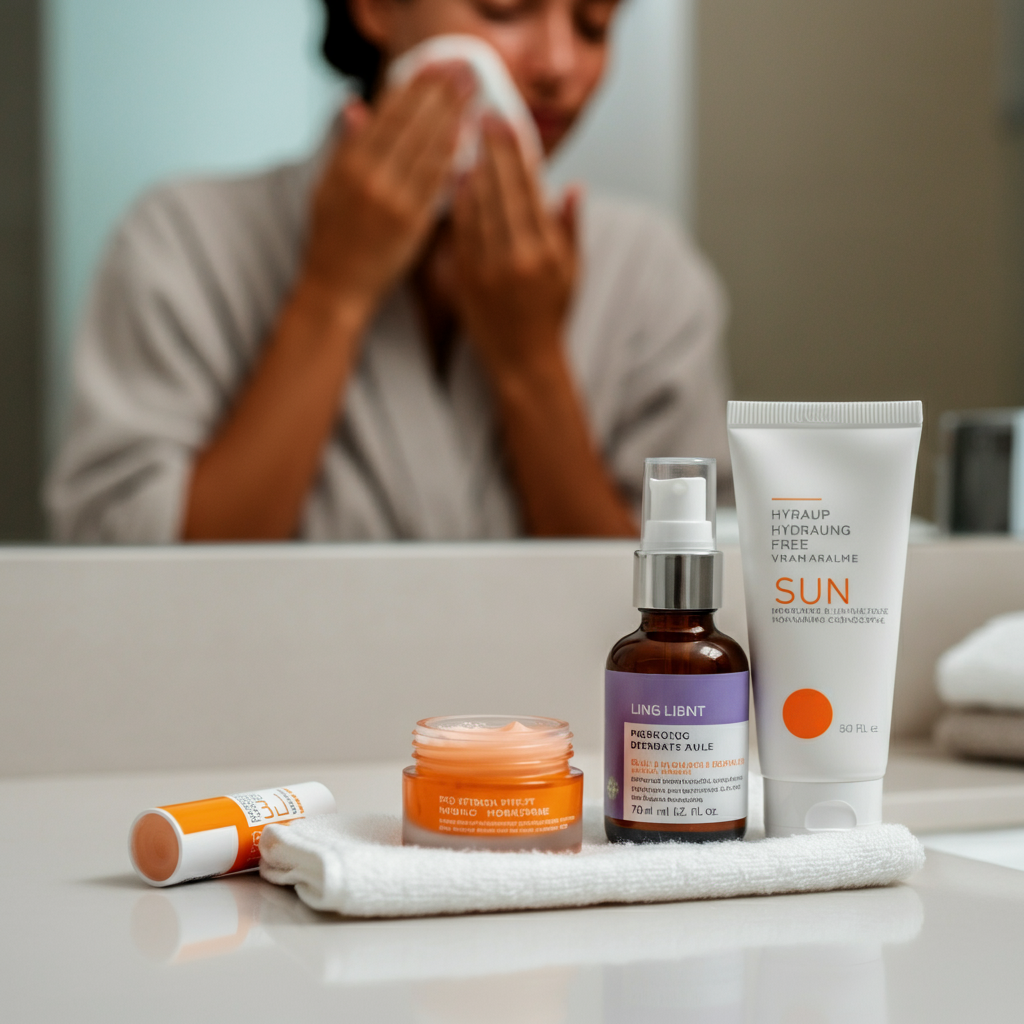
What You Need to Know About Wearing Makeup to a Colonoscopy
Most healthcare professionals advise avoiding makeup on the day of a colonoscopy for practical reasons. Here’s a detailed breakdown simplified to help you understand:
Why Should You Skip Makeup?
- Skin Monitoring
During medical procedures, your skin often provides vital signs for monitoring. Makeup can mask natural skin tones, making it harder for your doctor to identify any changes, like discolouration or irritation. This is especially important during sedation. - Risk of Contamination
Makeup products, especially foundation, can interfere with the sterile environment required for medical tools and equipment. Even small amounts of residue can contribute to bacterial transfer. - Prolonged Procedure Time
If makeup accidentally transfers to the medical equipment, additional time might be spent sterilizing surfaces, potentially delaying your procedure.
Makeup-Free Alternatives for a Fresh Look
- Apply a Hydrating Serum
Use a gentle, non-comedogenic product like CeraVe Hydrating Hyaluronic Acid Serum to keep your skin moisturized and glowing. - Choose Sunscreen for Radiance
A lightweight sunscreen, such as EltaMD UV Clear Broad-Spectrum SPF 46, will protect and nourish your skin while ensuring you look refreshed.
Key Tips to Prepare for the Day
- Moisturize Your Lips Instead of Applying Lipstick
A natural, hydrating lip balm, such as Vaseline Lip Therapy, can prevent your lips from feeling dry or cracked during the procedure. - Keep It Simple with Skincare
Cleanse your face with a gentle, fragrance-free cleanser like Cetaphil Gentle Skin Cleanser to start your day with fresh, clean skin. - Avoid Heavy Creams or Lotions
Stick to lightweight, non-greasy moisturizers to ensure a clean, product-free surface.
Pro Tip from a Dietitian and Fitness Expert
Remember, glowing skin comes from eating whole, nutrient-rich foods like avocados, nuts, and leafy greens. Staying hydrated with water and herbal teas is equally important to achieve natural radiance without relying on external products.
Can You Wear Makeup for a Colonoscopy?
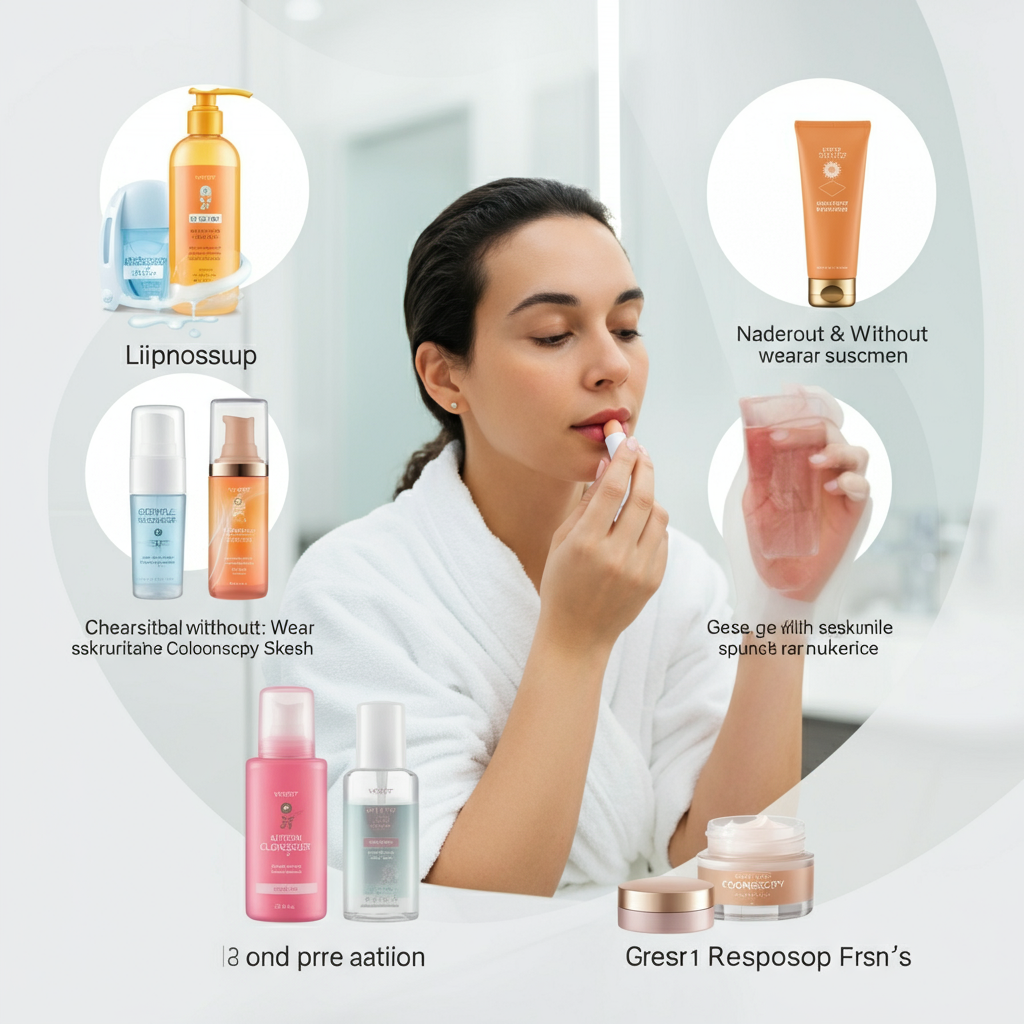
No, it’s not recommended to wear makeup for a colonoscopy. Here’s why:
- Interference with Medical Procedures
Makeup can obstruct precise monitoring of your skin’s natural color changes. Medical staff often assess your health by observing changes in your complexion, which makeup may mask. - Hygiene Concerns
During your procedure, smudged or flaky makeup might increase the risk of infections. This is because makeup residue can transfer to medical equipment, potentially compromising sterility. - Comfort Issues Post-Procedure
Some procedures involve lying on your side for extended periods. Heavy or smudged makeup can cause skin irritation, making you feel uncomfortable.
Alternative Ways to Feel Confident Without Makeup
If you’re hesitant to skip makeup because it helps you feel confident, don’t worry! Here’s what you can do instead:
- Ensure Your Skin Feels Refreshed
Cleanse your face thoroughly the night before with a gentle cleanser. Hydrate your skin with a lightweight moisturizer to maintain a natural glow.
(Try this sensitive-skin-friendly cleanser for prepping your skin naturally!) - Use a Tinted SPF or Lip Balm
Opt for a nourishing lip balm or tinted sunscreen with SPF to keep things simple while still enhancing your look slightly.
(Check out this dermatologist-approved tinted SPF for subtle radiance.) - Focus on Hydration and Diet
Eat hydrating foods like cucumbers, celery, and watermelon prior to your procedure. Drink plenty of water to ensure your skin looks fresh and moisturized.
Actionable Steps Before Your Colonoscopy
Here’s a quick checklist to prepare confidently:
- Avoid wearing makeup completely, no exceptions.
- Wash your face with a mild, hydrating cleanser to remove all residues.
- Skip heavy creams—use a lightweight, breathable moisturizer.
- Drink lots of water the day before for natural skin glow.
- Wear comfortable, loose clothing on the day of the procedure.
By following these simple steps, you can both comply with medical recommendations and feel your best, naturally. Skipping makeup for your colonoscopy ensures accuracy, cleanliness, and comfort—all essential for a smooth experience.
Can You Wear Makeup to a Colonoscopy?
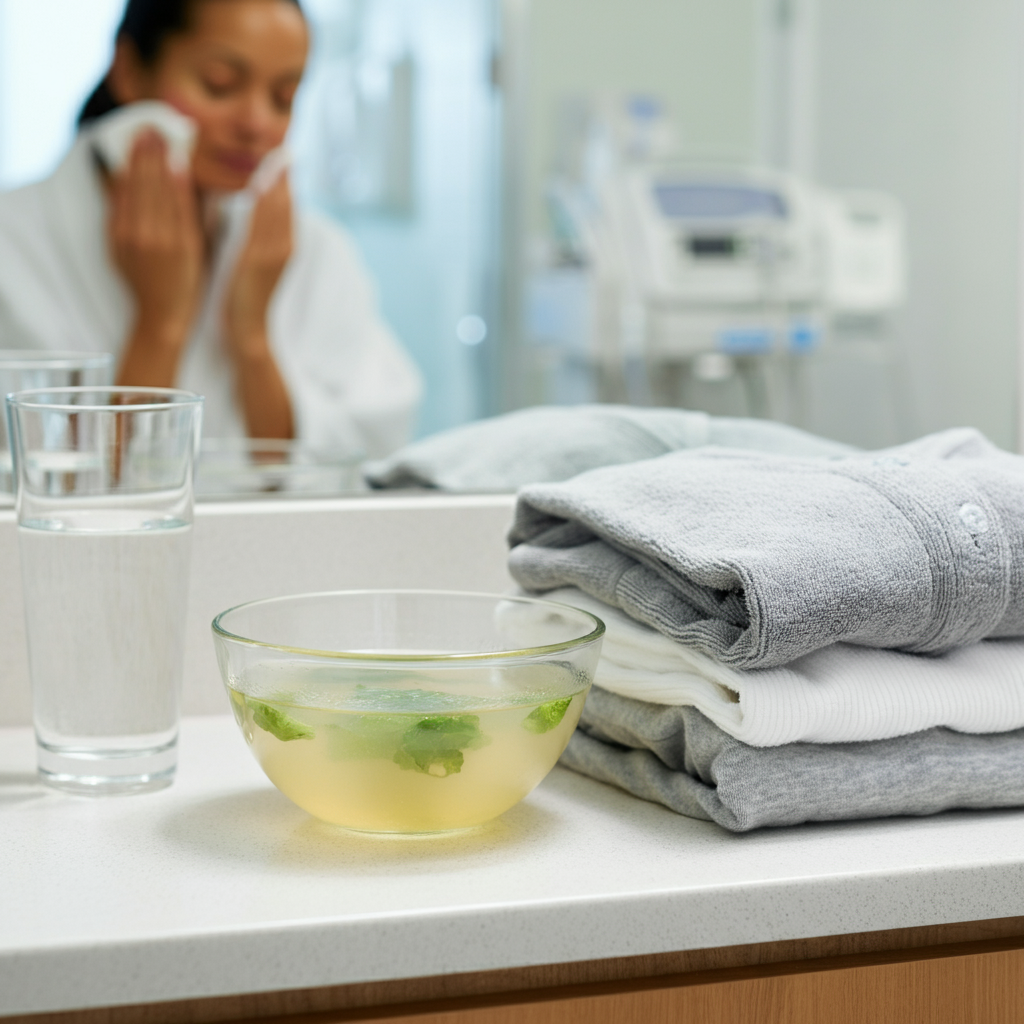
What to Expect When Preparing for a Colonoscopy
Preparing for a colonoscopy might seem overwhelming, but it doesn’t have to be. With proper guidance and preparation, you can make the process smooth, stress-free, and beneficial for your health.
Why Skipping Makeup is Essential
Wearing makeup during a colonoscopy can interfere with essential medical checks. Surgeons and medical staff need to observe your natural skin color to monitor changes during the procedure. Foundation, concealer, or heavy powders might create unnecessary complications. Prioritizing your health by avoiding makeup ensures accurate results and minimizes risks.
Helpful Tips for the Day of Your Colonoscopy
To ensure a smooth procedure and a comfortable experience, follow these simple guidelines:
- Stay Hydrated
Drink plenty of water and electrolyte solutions the day before the procedure. Hydration helps cleanse your system and supports overall well-being. - Dress for Comfort
Choose loose, breathable clothing that allows for easy movement. Elastic waistbands and soft fabrics work best. - Avoid Lotions and Perfumes
Skip applying any fragranced or greasy products that may irritate sensitive equipment or your skin. - Stick to a Clear-Liquid Diet
Consume only clear liquids such as broth, apple juice, or herbal teas 24 hours before the colonoscopy. Avoid red or purple liquids as they can stain the colon lining. - Follow Pre-Procedure Instructions
If your doctor prescribes a bowel prep solution, use it precisely as directed. The effectiveness of the procedure depends on how clean your colon is.
How Food and Fitness Play a Role
A balanced diet and regular fitness routine can positively impact your digestive health.
- Load Up on Fiber
Whole grains, vegetables, and fruits encourage regular bowel movements and reduce colon-related issues over time. Eating a daily salad packed with greens like spinach or kale works wonders. - Limit Processed Foods
Avoid excessive consumption of fatty, sugary, and processed foods. They can slow down digestion and add unnecessary strain on the colon. - Stay Active
Just 30 minutes of movement a few times a week supports gut health. Activities like walking, swimming, or gentle yoga are great options.
Timeline for Stopping Vitamins and Supplements
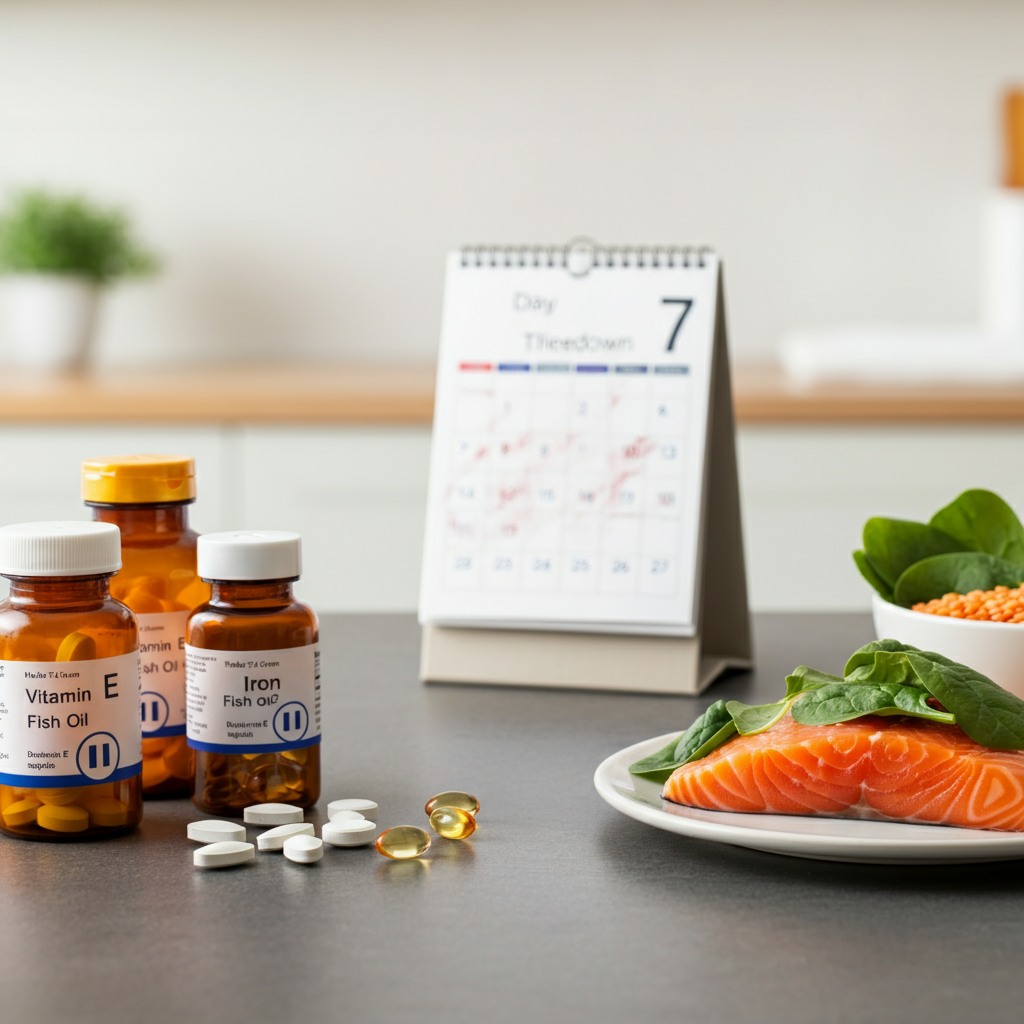
General Guidelines for Stopping Vitamins and Supplements
Stopping vitamins and supplements before a medical procedure is crucial for your safety. Some supplements may interfere with medications, increase bleeding risks, or affect anesthesia. Follow these tried-and-true guidelines for clarity and safety.
When to Stop
5-7 Days Before the Procedure
Most vitamins and supplements should be stopped about a week beforehand. This allows your body to clear them out and minimize risks.
Supplements That Interfere With Blood Clotting
- Vitamin E
High doses of Vitamin E can thin the blood, increasing bleeding risks. - Fish Oil/Omega-3 Fatty Acids
Though great for heart health, fish oil should be paused to prevent blood thinning. - Iron Supplements
If not instructed otherwise, stop taking iron unless needed for specific conditions like anemia. It can affect diagnostic imaging and stool samples.
Supplements to Avoid
- Multivitamins with high doses of Vitamin A, D, E, or K.
- Herbal Supplements:
Certain herbs like Ginkgo Biloba, St. John’s Wort, and Garlic. These can interfere with medications or increase bleeding chances.
Important Steps to Take
- Speak directly with a healthcare provider.
Ask specific questions about your vitamins and supplements based on your medical history.
Example question to ask your doctor: “Is it safe for me to pause Vitamin D supplementation for a week?” - Always check labels.
Some supplements sneak in ingredients that can impact blood or liver function. Read carefully for ingredients like Ginseng or Turmeric. - Plan replacements if needed.
For example, if you rely on iron, consider eating iron-rich foods like spinach, lentils, and red meat temporarily.
Product Comparison Table
| Supplement | Effect on Procedure | Risk | Safe Alternative |
| Vitamin E | Increases bleeding risk | Complicates anesthesia | Natural sources like almonds |
| Fish Oil | Blood-thinning properties | Delayed clotting | Omega-3-rich foods like salmon |
| Iron Supplements | Darkens stool | Mimics blood in diagnosis | Iron-rich foods like spinach |
| Fiber Supplements | Leaves residue in the colon | Affects visibility | Low-fiber diet |
| Garlic (Supplement) | Increases bleeding risk | Interferes with clotting | Use garlic in natural food quantities |
| Ginkgo Biloba | Increases bleeding risk | Prolonged bleeding during procedures | Avoid entirely before procedures |
| St. John’s Wort | Interferes with anesthesia medications | Prolonged sedative effects | Consult a doctor for alternatives |
Common Questions About Stopping Vitamins
 Can I Take My Daily Multivitamin?
Can I Take My Daily Multivitamin?
Daily multivitamins can seem harmless, but during certain procedures, they might complicate things. Some vitamins, like Vitamin E, may thin your blood, increasing the risk of excessive bleeding. A safer option is to focus on real, nutrient-rich foods like leafy greens, fruits, and nuts. For example:
- Spinach (rich in Vitamin K) helps with blood clotting naturally.
- Oranges and strawberries provide a healthy dose of Vitamin C.
- Almonds offer Vitamin E in a balanced, easily digestible form.
Switching to whole foods ensures your body gets its nutrients without interfering with procedures.
What About Prescribed Supplements?
If you’ve been prescribed supplements by a doctor, don’t stop them without first consulting. Prescribed supplements, such as iron or potassium, address urgent medical needs or deficiencies. Ignoring them might harm recovery or worsen your condition. Always ask your doctor for alternatives, like incorporating whole, iron-rich foods like lentils, beef liver, or fortified cereals into your meals. This approach ensures you’re working within your doctor’s guidance while supporting your body naturally.
Are There Any Exceptions?
Yes, exceptions exist, but only under professional supervision. For instance, patients deficient in Vitamin D may need supplements to maintain bone health, especially if they aren’t exposed to enough sunlight or consume fatty fish like salmon. Another example is folic acid for pregnant women to prevent birth defects. These cases should always be evaluated and prescribed by your healthcare provider.
Tips for Getting Nutrients Naturally
- Plan Colorful Meals
Include vegetables, fruits, proteins, and healthy fats in every meal. Example: A salmon salad with kale, avocado, and walnuts. - Snack Smart
Choose snacks like a handful of sunflower seeds or a boiled egg to keep energy levels up. - Hydrate Properly
Drinking enough water is key for digestion and nutrient absorption. Add a slice of lemon for flavor and Vitamin C. - Rely on Local Produce
Seasonal and fresh produce retains more nutrients. For example, berries in spring or squash in fall.
Switching from supplements to whole foods doesn’t just help your body heal better—it builds lifelong healthy habits.
Tips for a Smooth Preparation
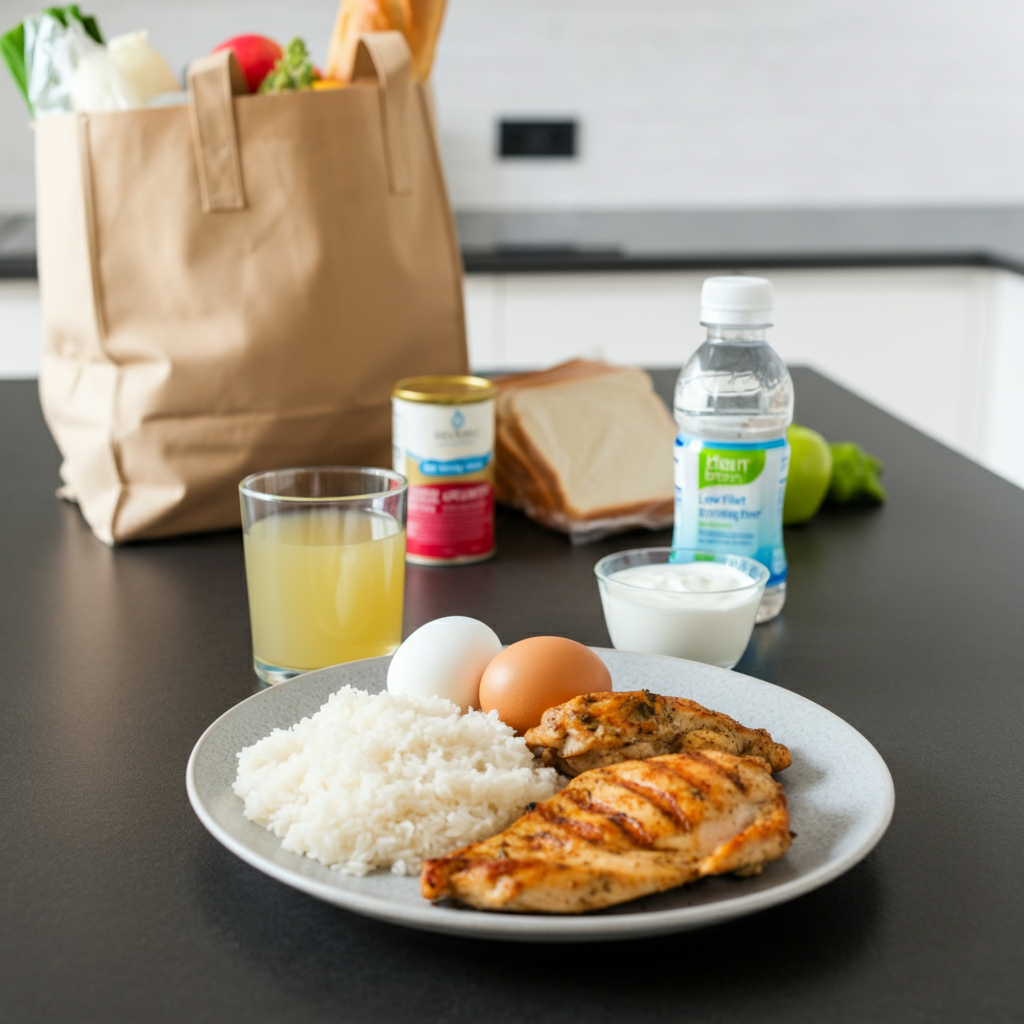
Dietary Adjustments for Optimal Preparation
- Switch to Low-Fiber Foods
A low-fiber diet is easier on your digestive system and reduces residue. Examples of low-fiber food options include white rice, plain yogurt, eggs, and lean protein like chicken or fish. Avoid whole grains, broccoli, beans, and high-fiber fruits such as apples or pears. These foods create bulk, which is counterproductive for this purpose. - Focus on Easily Digestible Meals
Meals like plain toast with a poached egg or a skinless baked potato are gentle on the stomach. Keep seasoning to a minimum and avoid fried or greasy foods. This promotes a smoother digestive process and reduces potential discomfort. - Replace High-Fiber Fruits with Juices
Instead of munching high-fiber fruits, go for clear fruit juices like apple or white grape juice. These provide energy and hydration without excessive fiber. Stay away from pulpy options, as the pulp adds unnecessary fiber.
Staying Hydrated
- Prioritize Clear Liquids
Clear liquids are not only about hydration but also keep the digestive tract clean. Options include clear broths (chicken or vegetable), herbal teas with no milk, and electrolyte-rich drinks like Gatorade. - Include Electrolytes
Balancing electrolytes helps maintain energy and prevents dehydration. Opt for coconut water, low-sodium electrolyte solutions, or diluted sports drinks. Avoid sugary sodas and caffeine, as they may dehydrate you. - Drink Water Regularly
Aim for at least eight glasses a day but sip steadily. Adding a slice of lemon or cucumber can enhance the flavor and make hydration enjoyable.
Organizing Your Schedule
- Plan Meals in Advance
Pre-plan low-fiber and digestive-friendly meals for the week before. This not only saves time but also guarantees you stick to the dietary requirements. - Shop for Ingredients Ahead
Stock up on items like lean protein, white bread, rice, and clear beverages early. Avoid the temptation of unhealthy snacks by keeping your pantry ready with compliant items. - Set Reminders for Eating and Hydration
Use a phone app or calendar to track meals and drinks. This avoids missing important hydration and ensures complete preparation for optimal results.
By following these steps, you are setting yourself up for a smooth preparation. Small, intentional adjustments can make a big difference when aiming for health-focused changes.
Risks of Not Following Guidelines
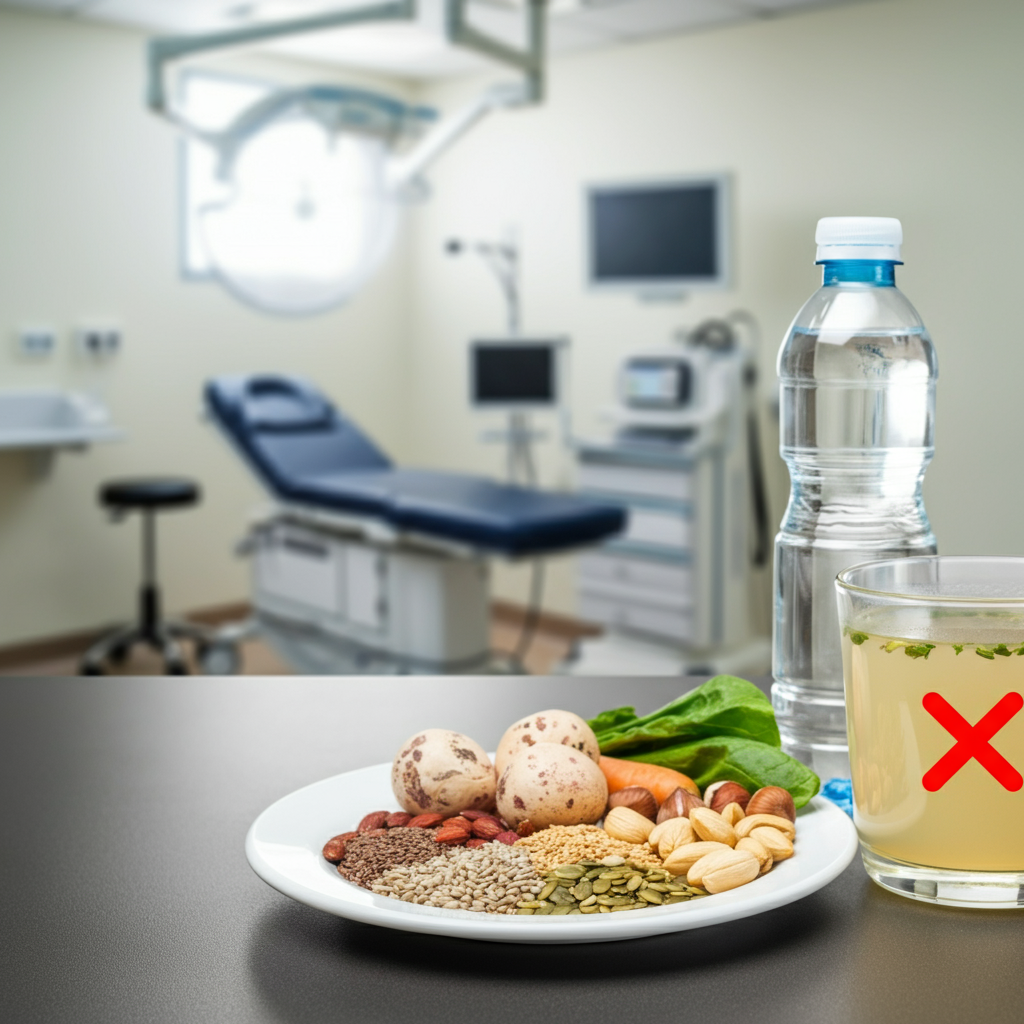
Complications During the Procedure
Failing to follow dietary and preparation guidelines can lead to serious complications during medical or fitness-related procedures. Here are the common issues you might face:
- Poor Visibility During Assessments or Procedures
Without proper preparation, residues in the digestive system may block clear views during exams, such as colonoscopies. This could result in missing critical indicators like polyps or abnormalities. These issues can compromise the accuracy of the results. For more details about colonoscopy preparation guidelines, visit the American Cancer Society. - Higher Risks of Bleeding or Adverse Reactions
Eating or drinking non-compliant foods before specific procedures can increase the risk of complications. For example, consuming fibrous foods prior to a colonoscopy may lead to irritation or perforation during the procedure. Similarly, poor hydration patterns may cause adverse reactions to anesthesia or medications.
Rescheduling the Procedure
Improper preparation can lead to the cancellation and rescheduling of procedures, which can be frustrating and costly for you. Here are practical reasons why this happens:
- Unprepared Systems Delay Examinations
If doctors cannot proceed due to an improperly prepared digestive system, the process must be delayed. This wastes time and resources. - Avoidable Financial and Emotional Costs
Rescheduling may involve extra expenses, like additional medical fees or needing to take more time off from work. The emotional toll of delaying a critical assessment can also be overwhelming.
How to Avoid These Risks
- Follow the Diet Strictly
Consume only the prescribed foods leading up to the procedure. For example, if your doctor recommends a liquid-based diet, include clear broths, herbal teas, and water. Avoid foods that leave residue, such as seeds, nuts, or raw vegetables. - Stay Hydrated Appropriately
Proper hydration clears your system and prevents complications during medical assessments. Aim for 8-10 glasses of water daily, or follow your doctor’s specific hydration protocols. - Plan Your Schedule in Advance
Keep track of all preparation steps, using apps or planners to ensure compliance. For instance, set reminders for liquid-only meal days or your last meal timing before the procedure.
By addressing preparation guidelines with care, you can minimize complications, save time, and foster better health outcomes.
Expert Advice and Resources
Practical Tips for Maintaining Optimal Health
When it comes to living a healthier life, focusing on real, wholesome foods and steady physical activity is key. Over the past decade, I’ve worked with clients from all walks of life who want to improve their health without relying on drugs or medications. Here’s a simple yet effective approach using clear steps tailored for long-term success.
1. Build Your Plate Around Whole, Real Foods
Eating nutrient-dense, real foods gives your body the energy and nourishment it needs.
- Fruits and Vegetables
Aim for five to seven servings daily. For instance, snack on apple slices or carrot sticks instead of chips. These foods are packed with vitamins and fiber. - Lean Proteins
Include sources like chicken, fish, eggs, or tofu in every meal. Grilled salmon with a side of sautéed spinach, for example, provides omega-3s and iron. - Healthy Fats
Add avocado, nuts, seeds, or olive oil to your dishes. A handful of almonds or a drizzle of olive oil over your salad supports heart health. - Minimize Processed Foods
Avoid foods high in refined sugars and artificial ingredients. Replace sugary sodas with herbal teas or water infused with lemon.
2. Stay Active Every Day
Consistent movement supports physical and mental well-being without requiring extreme intensity.
- Walk More
Walking is underrated yet powerful. A 30-minute brisk walk improves circulation and burns calories. - Strengthen Muscles
Incorporate two days of strength training weekly using your body weight, dumbbells, or resistance bands. Squats, lunges, and push-ups can be performed at home with minimal equipment.
(Get fitness tips from experts here.) - Stretch and Relax
Yoga or simple stretches reduce tightness and improve flexibility. Try 10 minutes in the morning or at bedtime.
3. Hydration is Non-Negotiable
Dehydration often masquerades as hunger, tiredness, or irritability.
- Drink at least eight glasses of water daily. Flavor it with cucumber slices or mint leaves for variety.
- Limit sugary beverages or caffeine as they may dehydrate you over time.
4. Sleep and Stress Management
Your body repairs and rejuvenates during sleep. Stress disrupts that balance.
- Set a Sleep Schedule
Aim for 7–8 hours of sleep. Going to bed at the same time nightly improves rest quality. - Practice Mindfulness
Meditation or journaling helps quiet a racing mind. Even 5 daily minutes bring clarity.
FAQs
Why do I need to stop taking vitamins before a colonoscopy?
Certain vitamins, particularly those containing iron or that are dark in color, can interfere with the clarity of the colonoscopy images. Iron supplements, for example, may darken the lining of the bowel, making it harder to detect abnormalities.
How long before a colonoscopy should I stop taking vitamins?
Most doctors recommend stopping all vitamin and supplement intake, including multivitamins, iron, or herbal remedies, at least 5 to 7 days before the procedure. However, always consult your healthcare provider for specific guidance.
Can I take vitamin D or calcium before a colonoscopy?
While vitamin D and calcium supplements are less likely to interfere with a colonoscopy, it’s best to temporarily stop taking all supplements unless your doctor advises otherwise. This ensures no hidden risks or complications arise during the procedure.
Do gummy vitamins or chewables need to be avoided as well?
Yes, even gummy vitamins should be avoided before a colonoscopy. They may contain additional coloring, sugar, or residues that can remain in the digestive tract and impact the accuracy of the procedure.
What should I avoid besides vitamins before my colonoscopy?
Along with vitamins, avoid foods with seeds, nuts, or whole grains, as well as fiber-rich foods. These can leave residues in the bowel. Clear liquids and the specific preparation instructions provided by your doctor are critical for an effective and accurate colonoscopy.


1 thought on “Why Stop Vitamins Before A Colonoscopy?”